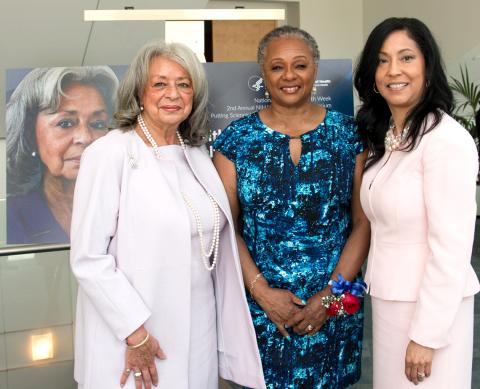Pinn Symposium Celebrates Women’s Contributions to Health

Attendees at the 2nd annual NIH Vivian W. Pinn Symposium, held recently at Natcher Conference Center, engaged in an informative exchange on the important caregiving roles of women—as leaders and practitioners in health care and pivotal members of families and communities. Worsening health care trends for U.S. women were also discussed at the symposium, titled “Healthy Women Make Healthy Communities: Women as Makers.”
Prior to the main presentations, Dr. Janine Austin Clayton, director of the Office of Research on Women’s Health, honored the accomplishments of Davene B. McCarthy White with the inaugural ORWH Director’s Award for caregiving in the field of nursing and for dedication to the children and families of Washington, D.C. A neonatal nurse practitioner and Howard University clinical assistant professor of pediatrics and child health, McCarthy White founded the Boarder Babies Program in 1989 to help provide for the well-being of abandoned, abused and neglected babies. She also directs the HUH CARES (Howard University Hospital Comprehensive Area Resources Entitlements and Services) program, which offers medical and other support services for HIV-positive patients and their families.
Speakers at the symposium included: Jacquelyn Caglia, associate director of the women and health initiative at the Harvard T.H. Chan School of Public Health; Dr. Afaf Ibrahim Meleis, professor of nursing and sociology and dean emerita at the University of Pennsylvania School of Nursing and co-chair of the Commission on Women and Health; and Dr. Jennifer Karas Montez, assistant professor of sociology at Syracuse University.
Presentations featured the work of the Commission on Women and Health, a worldwide partnership led by The Lancet, Harvard’s women and health initiative and the University of Pennsylvania, as well as research on the impact of state-level policies on negative trends in U.S. women’s health.
Commission co-chairs Meleis and Caglia reported on the group’s 3-year effort to reframe women’s health to account for women’s contributions as caregivers—in their families, communities and health care institutions—as well as women’s health care needs across the lifespan. The speakers recommended four ways to account more fully for women’s roles, health and contributions: value women, count women, compensate women and be accountable to women.
In her presentation, Karas Montez painted a startling picture of declines in U.S. women’s health, zeroing in on county-level trends in mortality rates. She linked worsening trends in women’s life expectancy to state policies. She said that 53 percent of the variation in women’s mortality rates from state to state can be attributed to state-level social, economic and policy factors, such as crime rate, unemployment rate and tobacco control measures. In contrast, state-level factors account for only 23 percent of the variation in mortality rates for men.
“What we’ve heard has the potential to deeply influence women’s health,” said Clayton in closing remarks. “Too often, women’s health is left out of the conversation, but it should be an integral part of every conversation related to health.” She encouraged attendees to count women, ask for the data associated with women, explicitly include women and do what they can to help improve the health of women in their individual spheres of influence.
The Pinn symposium was the pinnacle of ORWH’s celebrations of National Women’s Health Week. It honored ORWH’s first full-time director, Dr. Vivian Pinn, who led the office for 20 years. Pinn, who attended the event, emphasized the importance of the information that was presented, saying she “couldn’t take notes fast enough.”
The symposium videocast is available at https://videocast.nih.gov/summary.asp?Live=21966&bhcp=1.
